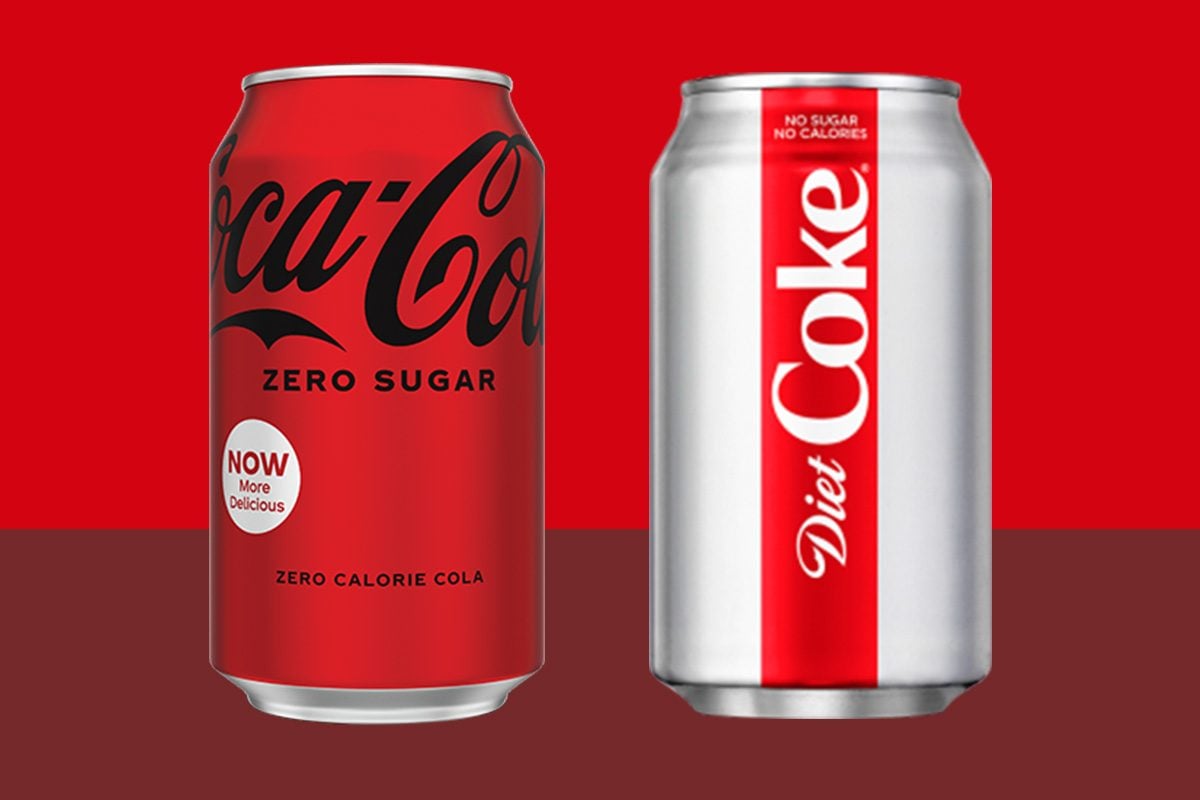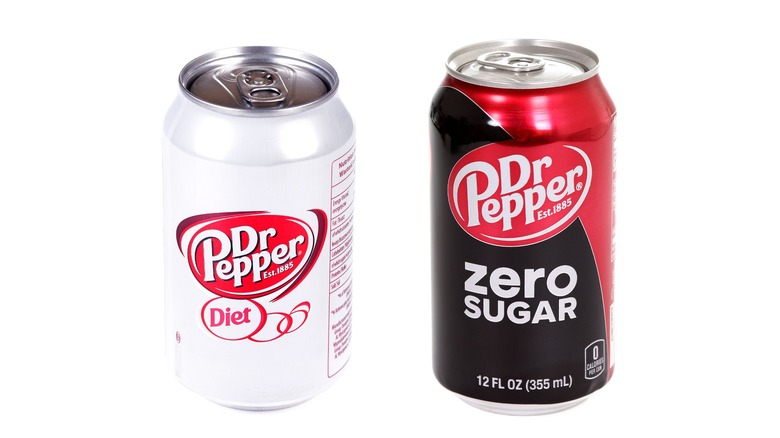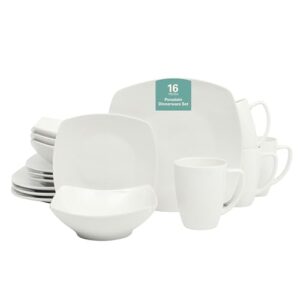Have you ever stood in front of a grocery store shelf, holding a can of soda, wondering whether to choose the ‘Diet’ or ‘Zero Sugar’ option? You’re not alone.
With the rising awareness about health and fitness, it’s only natural to scrutinize what you consume. But what exactly sets these two labels apart? The subtle differences could significantly impact your health goals. Understanding these nuances will help you make informed decisions, ensuring that your choices align perfectly with your lifestyle and dietary preferences.
Dive deeper into this article to uncover the mystery behind these popular beverage options and discover which one truly fits your needs. Your health journey deserves clarity, and we’re here to provide it.

Credit: www.healthline.com
Diet Vs Zero Sugar: Definitions
The terms “Diet” and “Zero Sugar” often confuse many. Both aim to reduce calorie intake. Yet, they have distinct differences. Understanding these differences helps make informed choices.
Diet drinks are low-calorie beverages. They often use artificial sweeteners. These drinks mimic the taste of sugar without added calories. Popular diet drinks include diet soda and diet iced tea.
Zero Sugar: What Does It Mean?
Zero Sugar drinks contain no sugar at all. They use artificial or natural sweeteners. These sweeteners do not add calories. Zero Sugar drinks aim to provide a sugar-free experience. They are ideal for those avoiding sugar entirely.
Key Ingredients In Diet Drinks
Diet drinks often contain aspartame or sucralose. These are common artificial sweeteners. They provide sweetness without extra calories. Some drinks use stevia, a natural sweetener. Each sweetener has its unique taste profile.
Key Ingredients In Zero Sugar Drinks
Zero Sugar drinks may use stevia or erythritol. These sweeteners have no calories. They offer a sugar-like taste. Some Zero Sugar drinks include monk fruit extract. This natural sweetener is gaining popularity.
Target Audience For Diet Drinks
Diet drinks attract calorie-conscious individuals. They are popular among those managing weight. Many choose them for their sweet taste without guilt.
Target Audience For Zero Sugar Drinks
Zero Sugar drinks appeal to those avoiding sugar. They are popular among diabetics and those on low-sugar diets. These drinks provide a sweet alternative without sugar spikes.

Credit: nypost.com
Composition Of Diet Drinks
Diet drinks often contain artificial sweeteners like aspartame, while zero sugar drinks focus on eliminating all sugar. Both options aim to reduce calorie intake but differ in their ingredient composition and sweetening methods.
Diet drinks are popular among those seeking healthier choices. They promise fewer calories and sugar-free options. Understanding their composition can help in making informed decisions. Let’s explore the elements that make up diet drinks.Sweeteners Used
Diet drinks often use artificial sweeteners. These sweeteners provide sweetness without calories. Aspartame, sucralose, and saccharin are common choices. They are much sweeter than sugar. This allows for less quantity to be used in drinks. These sweeteners help maintain the taste consumers expect. They are approved by health authorities. Concerns exist about their safety, but studies have shown they are safe in moderation.Caloric Content
Diet drinks are low in calories. This is their main selling point. The absence of sugar reduces the calorie count significantly. Most diet drinks have near zero calories. This makes them attractive to those counting calories. It’s important to check labels. Some diet drinks may have minimal calories due to other additives. But they are generally much lower than regular versions.Nutritional Additives
Diet drinks sometimes contain added nutrients. Vitamins and minerals can be added for extra health benefits. These additives aim to enhance the drink’s nutritional profile. They can include vitamins like B12 or C. Minerals such as calcium might be added too. This makes diet drinks more than just thirst-quenchers. Consumers often appreciate these added benefits. But it’s essential to read the label for specific additives.Composition Of Zero Sugar Drinks
Understanding the composition of zero sugar drinks is key to distinguishing them from their diet counterparts. These beverages have become a popular choice for those looking to reduce sugar intake without sacrificing flavor. But what exactly goes into these zero sugar drinks that make them a viable alternative?
Artificial Sweeteners
Zero sugar drinks often rely on artificial sweeteners to mimic the taste of sugar. Common sweeteners include aspartame, sucralose, and stevia. These ingredients are significantly sweeter than sugar, which means only a tiny amount is needed to sweeten a drink.
Ever tried a zero sugar drink and wondered why it tastes so sweet? It’s the magic of these sweeteners working to provide that familiar sugar taste. This allows manufacturers to create a product that satisfies your sweet tooth without adding sugar.
Impact On Taste
One concern people have about zero sugar drinks is taste. Artificial sweeteners sometimes have a slightly different aftertaste compared to sugar. However, many manufacturers have perfected their formulas to closely match the taste of regular sodas.
Have you noticed that some zero sugar drinks taste better than others? This is due to the different combinations of sweeteners used. Your taste buds might prefer one blend over another, so it’s worth experimenting.
Calorie-free Ingredients
Zero sugar drinks are not just about cutting sugar; they’re also about cutting calories. The sweeteners used are calorie-free, meaning they don’t contribute to your daily calorie intake. This makes them an attractive option for those watching their weight.
Ever wondered how you can enjoy a fizzy drink without the guilt? Zero sugar drinks offer that possibility by using calorie-free ingredients. It’s like having your cake and eating it too, without the extra calories!
So, next time you reach for a zero sugar drink, consider what’s inside. Are the ingredients aligning with your health goals? Understanding the composition can help you make informed choices that suit your lifestyle.
Health Implications
Understanding the difference between diet and zero sugar drinks can impact health significantly. Both options aim to reduce sugar intake, but their effects can differ.
Weight Management
Diet sodas often contain artificial sweeteners. These sweeteners provide fewer calories. Zero sugar drinks also use alternative sweeteners. They help reduce calorie intake. Many people choose these drinks to manage their weight. Yet, the impact on metabolism can vary. Some studies suggest diet sodas might trigger cravings. This can lead to increased food consumption. Zero sugar options might not have this effect.
Blood Sugar Levels
Managing blood sugar is crucial for health. Diet drinks contain sweeteners like aspartame or saccharin. These do not raise blood sugar levels. Zero sugar drinks also avoid sugar. They use alternatives like stevia or sucralose. These do not spike blood glucose. This can benefit those with diabetes. Monitoring blood sugar regularly is important.
Dental Health
Sugar intake affects dental health significantly. Diet drinks contain acids that can erode enamel. Zero sugar drinks also contain acids. They may not have sugar but can still harm teeth. Rinsing with water after consumption helps. Regular dental check-ups are necessary. Maintaining oral hygiene is key to preventing cavities.
Consumer Preferences
Diet sodas and zero sugar drinks both appeal to health-conscious consumers. Diet sodas often contain artificial sweeteners, while zero sugar options may use natural substitutes. Preferences vary based on taste and health considerations.
Understanding the difference between diet and zero sugar options can help you make informed choices based on your preferences. Do you prefer a drink that tastes closer to the original, or are you more concerned with calorie count? Often, these choices are influenced by taste, marketing tactics, and price. Let’s dive into each of these aspects to see how they shape what you pick off the shelf.Taste Differences
The taste of a beverage can be a deal-breaker for many. Diet drinks often use artificial sweeteners like aspartame, which some people find leaves a distinct aftertaste. On the other hand, zero sugar options use alternatives like sucralose or stevia, which can offer a cleaner finish. Have you ever noticed that diet drinks taste sweeter? It’s because the sweeteners are much more potent than sugar. However, zero sugar drinks aim to mimic the original taste more closely, sometimes winning over those who are picky about flavor. So, when choosing, consider what matters more to you—a closer match to the original or a unique taste experience?Marketing Influence
Marketing plays a huge role in shaping our preferences. Brands often position diet drinks as the classic low-calorie choice, appealing to those who are calorie-conscious. Zero sugar options are marketed as more modern and sometimes healthier alternatives, emphasizing the absence of sugar rather than just low calories. Next time you’re shopping, pay attention to the packaging and labeling. Do you notice how zero sugar options often highlight “no sugar” prominently on the label? This can make them more appealing if you’re trying to avoid sugar specifically. But remember, marketing can sometimes overshadow actual taste or nutritional content.Price Considerations
Price can also influence your decision. Have you noticed that diet drinks are often priced similarly to their sugary counterparts? This makes them an easy switch for those looking to cut calories without breaking the bank. Zero sugar drinks might sometimes be priced higher due to newer formulations or branded ingredients. But is the slight price increase worth the taste and health benefits? Always weigh your options—sometimes paying a little extra offers a better overall experience. Ultimately, your preference between diet and zero sugar drinks boils down to what you value most—taste, marketing appeal, or budget. Next time you’re in the beverage aisle, keep these factors in mind and see how they influence your choice. What will you reach for?Environmental Impact
Environmental impact plays a crucial role in choosing diet or zero sugar drinks. Both options have different effects on the environment. This section explores how each impacts packaging, production, and sustainability. Understanding these factors can help make more eco-friendly choices.
Packaging Waste
Packaging waste remains a major concern for both diet and zero sugar drinks. Diet drinks often use aluminum cans. These cans are recyclable, but not everyone recycles. Zero sugar drinks sometimes use plastic bottles. Plastic is less eco-friendly. It takes years to break down.
Choosing drinks in recyclable materials can reduce waste. Always check for recycling options in your area. This small step can make a big difference.
Production Process
The production process also affects the environment. Diet drinks use artificial sweeteners. These sweeteners need chemical processing. This process can lead to pollution. Zero sugar drinks use similar methods. But they often rely on different ingredients.
Both processes can impact air and water quality. Choosing brands that focus on cleaner methods can help. Look for companies that prioritize eco-friendly production.
Sustainability Efforts
Some brands take extra steps to be sustainable. They use renewable energy sources. They focus on reducing their carbon footprint. Both diet and zero sugar drinks can be part of these efforts. Supporting brands with strong sustainability goals can drive change.
Check for certifications on the packaging. These can indicate a brand’s commitment to sustainability. Every choice matters in protecting our planet.
Future Trends In Beverage Industry
The beverage industry constantly evolves with consumer preferences. Two popular choices are diet and zero sugar drinks. Understanding future trends can help anticipate changes. These trends include innovations in sweeteners, growing health consciousness, and shifting market dynamics.
Innovations In Sweeteners
Sweeteners shape the taste and health profile of drinks. Recent innovations focus on natural and low-calorie options. Stevia and monk fruit are gaining popularity. They offer sweetness without calories. This trend reflects a shift towards healthier alternatives.
Artificial sweeteners are being refined to improve taste. Aspartame and sucralose are used less. Consumers want natural ingredients. Companies invest in research for better options. Enhanced sweeteners will redefine diet and zero sugar beverages.
Growing Health Consciousness
Health awareness influences beverage choices. People seek drinks that support well-being. Low sugar and calorie options are preferred. Diet and zero sugar drinks address these needs. They provide a guilt-free indulgence.
Labels and transparency are crucial. Consumers demand clear information on ingredients. Brands showcase their health benefits. This trend drives innovation in product development. Health-conscious consumers shape future beverage offerings.
Market Dynamics
Market dynamics are shifting with consumer behavior. Demand for healthier drinks is rising. Companies adapt by diversifying their portfolios. They introduce new flavors and formulations. Competition in the beverage industry is fierce.
Brand loyalty plays a role. Established brands maintain their market position. New entrants challenge them with unique offerings. The market evolves with changing preferences. Understanding these dynamics is key for success.

Credit: www.tasteofhome.com
Frequently Asked Questions
What Is The Main Difference Between Diet And Zero Sugar?
Diet drinks often contain artificial sweeteners instead of sugar. Zero sugar drinks, on the other hand, aim to contain no sugar at all while maintaining flavor. Both options reduce calorie intake compared to regular sugary drinks, but their ingredients and taste can vary significantly.
Are Diet Drinks Healthier Than Zero Sugar?
Healthiness depends on individual dietary needs and preferences. Diet drinks may have artificial sweeteners that some people avoid. Zero sugar drinks focus on eliminating sugar content. Both are lower in calories than regular sugary drinks, but ingredient lists should be checked for specific health concerns.
Do Diet And Zero Sugar Drinks Taste Different?
Yes, they can taste different. Diet drinks use artificial sweeteners, which may alter flavor profiles. Zero sugar drinks often attempt to mimic the taste of regular drinks without sugar. Taste preferences vary, so trying both can help determine which one suits you better.
Can Zero Sugar Drinks Help With Weight Loss?
Zero sugar drinks can aid in weight loss by reducing sugar and calorie intake. They offer a lower-calorie alternative to sugary beverages. However, maintaining a balanced diet and exercise is crucial for effective weight loss. Always consult with a healthcare professional for personalized advice.
Conclusion
Understanding the difference between diet and zero sugar can simplify choices. Diet drinks usually have fewer calories but may contain artificial sweeteners. Zero sugar drinks remove sugar completely, appealing to those avoiding sugar. Both options offer benefits, depending on health goals.
Choose diet for calorie control. Opt for zero sugar to avoid sugar intake. Reading labels helps make informed decisions. Know what fits your lifestyle and preferences best. Make choices that support your health needs. Enjoy beverages wisely, considering your goals and tastes.
Your health journey matters, so select wisely and enjoy every sip.


